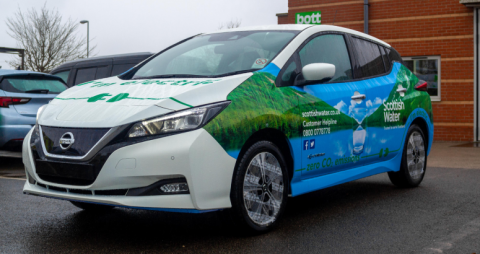Transitioning our fleet to electric vehicles, installing supporting infrastructure and trialling alternative fuels to reduce our transport related carbon emissions to contribute towards Scottish Water's Beyond Net Zero ambition.

Scottish Water
Go To WebsiteAddressed Challenges:
- Carbon emissions
Action Areas:
- Transport
Initiative Purpose:
- Adaptation
The Story

Scottish Water's fleet is a vital part of delivering our water and wastewater services across Scotland and is currently responsible for 7% of our carbon emissions. As part of our drive to reach net zero carbon emissions by 2040, we are transitioning our fleet to electric vehicles (EVs) when it is economic and operationally practicable.
So far, we have transitioned over 10% of our commercial vehicle fleet to electric, our lease car scheme is now fully electric, and we have introduced a salary sacrifice scheme for employees to make it more accessible and affordable for them to transition their own personal cars to electric. We now have 540 EVs on our fleet, including company cars and salary sacrifice. To enable this transition, we have installed 374 EV charging points across 200 SW sites - including 5 in Dundee - and have installed home chargers for employees who take their commercial vehicles home.
In addition to transitioning to EVs, Scottish Water is also trialling use of HVO for our commercial vehicles. We are doing this by working with our capital alliance partners to share infrastructure, using public refuelling stations and also, installing HVO tanks at 3 of our sites.
Success & Outcomes
While we are able to measure our progress and success in terms of the percentage of our fleet that we have already transitioned and the miles travelled in those vehicles, we are also keen to ensure that our employees are constantly feeding back to us about their experiences of using electric vehicles and what we need to do to support them in being able to use those comfortably. In particular, we have people working in relatively remote parts of Scotland and ensuring there are enough charging facilities available, so they do not have to worry about range is key in getting our staff to support our transition to EVs.
Advice for others looking to do something similar
Scottish Water worked with Cenex, a low emission research consultancy, to validate assumptions regarding our decarbonisation strategy. This included analysis of our commercial vehicle makes / models, utilisation and user cases, and a market scan of available low emission technology (electric, hydrogen, bio diesel, gas). We also worked closely with other fleets, to share ideas and learn from others what worked well, and what didn't. Also, engaging employees and EV drivers was essential to understand and overcome potential challenges.
